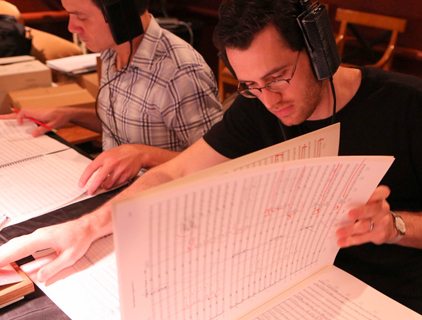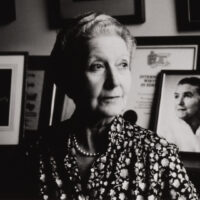
On-campus collaboration sparks student composer’s career
“I owe everything to having gone to USC.”
By
Composer Austin Wintory (BM ’07) is a rising star in the world of film and video games. He is the youngest composer ever to receive a British Academy of Film and Television Arts (BAFTA) nomination, the first composer to receive a GRAMMY Award nomination for scoring a video game soundtrack, and the winner of numerous awards from BAFTA, the Academy of Interactive Arts and Sciences and ASCAP.
But none of that would have happened if Wintory didn’t transfer to USC Thornton during his junior year of college to study in the Composition program.
“I always assumed I’d move to Los Angeles to pursue my career,” Wintory explained. “USC’s appeal was that it’s a powerful place with close proximity to everything that interested me — games, film and, of course, the concert music world.”
Because of certain degree requirements, transferring normally prohibits Composition students from completing undergraduate degrees in the standard four years. However, Wintory successfully petitioned the department to allow him to replace selected courses with private lessons — one-on-one versions of the same coursework his peers already completed.
The department soon arranged for Wintory to take lessons in counterpoint with USC Distinguished Professor of Composition, Morten Lauridsen.
“Studying with Professor Lauridsen is, without a question, a highlight of my education,” Wintory said. “His presence at USC was a big reason why I wanted to transfer to the school.”
Wintory notes that USC Thornton’s desire to push students to explore interdisciplinary study, or to apply their music study to other genres or industries, also proved to be an integral aspect of his education.
“At ‘SC, you can study with someone like Morten Lauridsen, and then talk about something like television music without being looked down upon. That’s not true at some of the other institutions where one can study classical music. The significance of that was not lost on me during my time on campus.”
Wintory also utilized the many connections offered to him as a USC Thornton student to collaborate with other artists both at the university, as well as student artists at other local institutions. The friendships and working relationships Wintory made while at USC soon proved to be one of the launching points for his composition career.
In 2006, Wintory met Jenova Chen, an MFA student in the Interactive Media program at USC’s School of Cinematic Arts whose class projects had already garnered attention from top video game executives. Wintory was soon tasked with the job of scoring Chen’s master’s thesis, flOw — an intensely stylized, yet simple game in which players control the actions of a water-dwelling microorganism. The game proved to be a success, and was soon developed for Sony’s PlayStation platform under an optioning deal offered to Chen’s development company, Thatgamecompany. flOw ultimately became the most downloaded game of 2007 on the PlayStation Network, and was awarded “Best Downloadable Game” at the 2008 Game Developers Choice Awards.
https://www.youtube.com/watch?v=s5B171Xo0dM
flOw’s rampant popularity suddenly thrust Wintory, who was still in the midst of completing his studies, into the spotlight.
“Four months before I had even graduated, I had a PlayStation3 game on the market,” he said. “Of course, years later, Jenova would go on to make ‘Journey,’ on which now my entire career has been based. I would have never have met him had I not gone to USC.”
Wintory also credits USC with providing him access to meet Amin Matalqa, a student director from the American Film Institute he discovered on an email list for student composers and filmmakers. Wintory would later be shortlisted for the 2009 Academy Award for Best Original Score for his work on Matalqa’s debut feature, Captain Abu Raed.
Although Wintory enjoys scoring for a variety of media, he admits that his work on video games comes with the most recognition and admiration.
“There’s no question that the love a composer gets from video game fans is rather disproportionate to other mediums,” he said. “It is very much a supportive and tight-knit community.”
Rampant gamers often develop an emotional attachment or interest in the scores of games they play because of the amount of time and energy a player devotes to interacting with one particular title. Unlike books or television programs, Wintory noted that video games often take hundreds of hours for players to complete.
“Games are interactive and are, by design, something you engage with and incorporate with your life,” he said. “A game like Skyrim takes between 30 to 40 hours to play — and many players spend well over 100 or 200 hours on that game. One of my favorite works of all-time is Bartók’s Concerto For Orchestra, and I haven’t even listened to that for 40 hours. When’s the last time you listened to a specific piece of music or an album for 40 to 100 hours besides when you’re playing a video game?”
In addition to several projects still in development, Wintory is currently working on the score for a handful of games, including the highly anticipated title, Abzu. Yet, despite the amount of success headed his way, Wintory hasn’t lost sight of his roots as a young Trojan.
“My career was launched by just having the dumb luck of being at the school when the right thing happened,” he said. “I owe everything to having gone to USC.”

